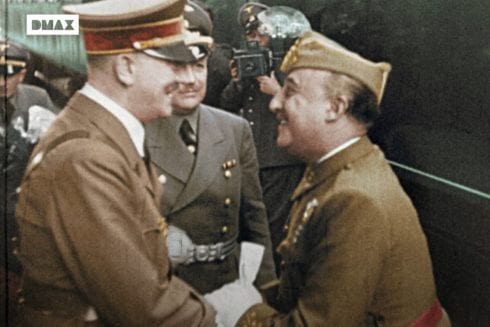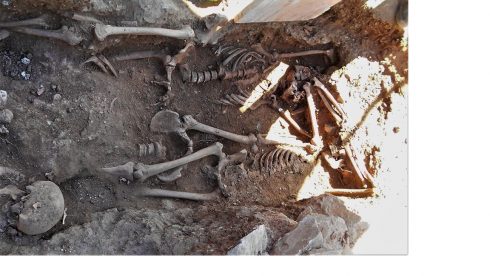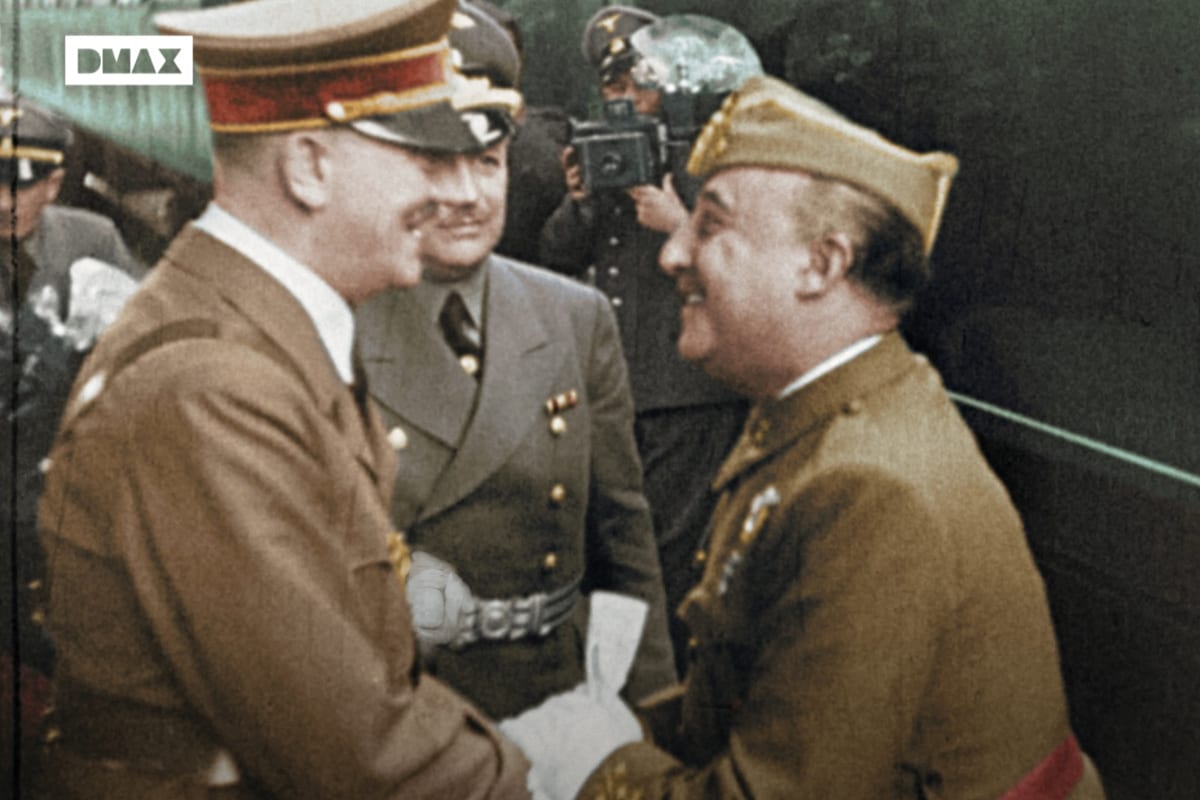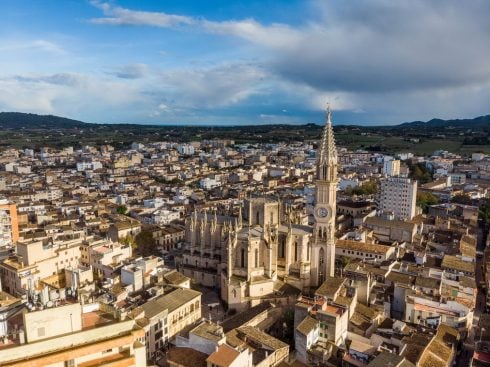IMAGINE if, rather than losing the Second World War and committing suicide in Berlin, Adolf Hitler had successfully invaded the British Isles and ruled them as a dictator before dying peacefully in his bed in 1975.
Then imagine if a law brought in after his death protected all those who assisted the regime, making them free from prosecution.
Next, picture a country where hundreds of thousands of former opponents lie in mass graves, which the new democratic government – in the interests of national reconciliation – feels it best to ignore. And notice that the Nazi flag, with its infamous insignia, had not been replaced as the national flag; just that the swastika was replaced with the British lion and a unicorn.

Finally, take note that Hitler’s children continue to live in lavish estates around the UK, while the dictator himself lies in a huge mausoleum in the Home Counties. A shrine, if you like, to all those (including numerous academics, businessmen and politicians) who still believe he made our country what it is today.
What may sound like a Robert Harris novel is very much the reality in Spain, 45 years after the death of Generalissimo Francisco Franco.
The guns may have fallen silent, but the civil war continues, if not in the mountains of Aragon then across the dining room table and looming over the forthcoming election in Catalunya.
This is in part to be expected; the trauma of going through a brutal civil war in which over 500,000 people were shot, tortured or starved to death.
But the suffocating lack of closure afforded to many after the gruesome events of 1936 to 1939, and the harsh dictatorship that followed, has bred a tired, bitter resentment among many Spaniards, one that goes to the core of how they see themselves as a people.
Much is due to the nature of the regime Franco imposed on his conquered countrymen, after deposing the democratically-elected government.
During nearly four decades of his Catholic Nationalist dictatorship, criticism of the regime and attempts to sabotage it were viciously silenced.

Even regional languages, particularly Catalan and Basque, were suppressed in the aim of returning Spain to the perceived glory days of the pre-Enlightenment era. The days when the army and Church were answerable ‘only to God and to history’.
While from the 1950s quality of life did experience an upturn, and token movements towards liberalization were made to curry economic favour with America, the Franco era is generally seen as a time in which the ugliest extremes of conservatism were allowed free rein.
What is certain is that Spain was held decades behind the rest of the continent economically and socially thanks to Franco’s twisted interpretation of history and nationhood.
Remember that Germany and Italy found closure at the end of their fascist regimes.
While Hitler and Mussolini suffered gruesome deaths, Franco passed away peacefully in his bed at the ripe age of 82, in 1975, surrounded by his family.
He died having no reason to believe Spain was set to change; the government was comprised of Falangists and religious leaders. His Prime Minister was Carlos Arias Navarro, known as ‘the Butcher of Malaga’ for summarily executing 17,000 political prisoners during the civil war, and the dictator’s hand-picked successor, the new King Juan Carlos I, had sworn to continue his legacy. The future of Falangist Spain, ‘One, Great and Free’, seemed assured.
The politicians who led the famous ‘Transición’ back to democracy (most of them, ironically, die-hard Falangists) inherited a country lurching towards chaos.
The army, which maintained huge influence over state affairs, had no reason to welcome democracy.
Meanwhile the country was rocked by riots, protests and strikes by supporters of the exiled political parties calling for free elections.
A return to civil conflict was looking likely and a compromise needed to be found.
It meant that King Juan Carlos would remain head of state, while there would be no purge of the armed forces.
But most pertinently, there would be an amnesty for all those who had done the regime’s dirty work, including now-ageing war criminals.
The infamous ‘Pacto del Olvido’, or Pact of Forgetting, was born: an unspoken agreement that the past would not be discussed, and that the country would move on as one.
Europe’s most forthright people, effectively swore themselves to silence, because the truth somehow seemed untouchable.
It was certainly true that seeking vengeance on the old regime in the late 1970s could have been catastrophic, and Spain certainly deserves praise for its (largely) peaceful transition from dictatorship to democracy, something that has rarely happened before.
But, as any psychologist will tell you, bottling up trauma is not a good idea.
With an enormous 2,500 mass graves scattered around the country and an estimated 140,000 victims inside them, that’s a lot of trauma and grief.
While some landowners and religious figures were killed in Republican areas the majority were massacred by Franco’s regime.
Until recently, no government has dared to approach this matter, despite calls by thousands of families for the reburial of loved ones.
Many still live close to the unmarked tombs of their parents or siblings, and can tell you their exact location. But, unfortunately, most family members have now passed away without receiving the closure that reburial would bring.
Attempts by local governments to deal with their mass graves are typically met with a massive pushback, largely from the right-wing PP and Vox parties, who argue that it would go against the Pacto del Olvido and only inflame old tensions.
Even when the central government does take an interest in exhuming the victims, such as when the Zapatero government freed up funding for it in 2007, it can just as easily be cancelled, as it was, by the next administration.
Meanwhile, the family of Franco inherited an estimated 600 million dollars on the dictator’s death, as well as being allowed continued ownership of artworks and lavish palaces across the country.
It is only in the past few years that the government has finally begun to reclaim these properties, taking the stance that, as Franco assumed power illegally, the estate he accumulated as head of state was not his to pass on.
The amnesty protecting criminals during and after the civil war means that, across the country, families still feud over what their parents and grandparents did to each other.
Nearly every town and village saw looting, arson, repression and murder, which, with no hope of legal resolution, has, as its only outlet, long decades of festering resentment.
Even the national flag remains largely unchanged: The falangist symbols and imposing black Eagle of St John are gone, but the red and yellow banner, a monarchist symbol adopted by the nationalists at the start of the civil war, continues to fly from all government buildings.
It is an affront to many – particularly in regions like Catalunya, which suffered badly under Franco – that the flag which is meant to symbolise nationhood instead symbolises the limbo caused by an ability to confront history.
Fortunately attempts to deal with limbo have been gathering pace.
In 2019 the government declared its intention to locate and rebury 25,000 people in mass graves by 2024.
The Franco family meanwhile, is being stripped of its physical inheritance; including the Pazo de Meiras palace in Galicia, which was vacated in 2020, only allowing the family to take the electro-domestics.
The year before Franco’s coffin was famously moved from its mausoleum in the Valley of the Fallen to a simple family tomb in Madrid.
Most importantly the 2007 Law of Historical Memory still stands, giving rights to those who were persecuted or suffered repression during the dictatorship.
There is financial aid for those trying to locate relatives and grants citizenship to the descendants of those who fled Spain in the aftermath of the civil war.
Efforts are, therefore, being taken to right wrongs, in cases where it is not too late. While the masterminds of the Transición surely cannot be blamed for their reluctance to make a hard break with the past, Spain is waking up to the uncomfortable fact that reconciliation has to come from dialogue, not silence.
Grass can cover the battlefields, the veterans can grow old, the memories can fade. But as we have seen, until Europe’s most outspoken and effervescent people forsake their collective denial, their civil war cannot be considered over.
DID YOU KNOW?
Army generals from the old regime were not replaced during the Transición to democracy, meaning the military continued to be dominated by Falangists, who subscribed to the old Castilian philosophy that the army and government were indivisible. In 2020, Francisco Beca Casanova, an air force general who retired in 2004, professed in a Whatsapp group a desire to ‘shoot 26 million Spaniards’, lauded Franco as ‘irrepetible’, and was one of 73 former senior officers who submitted an open letter to the king calling on him to dissolve the current socialist government.
MASS GRAVES: WHERE DO THE PARTIES STAND?
PSOE: Spain’s biggest socialist party, currently leading its coalition government, has been the driving force behind the opening of mass graves since President Zapatero introduced the Law of Historical Memory in 2007. The party also launched citizen-led platforms in areas with mass graves, aimed at encouraging local engagement.
PP (People’s Party): The right-wing party is the main opposition to the disinterment of the mass graves. It proposes the replacement of the Law of Historical Memory with a more nebulous ‘Law of Concordance’, which it claims will champion ‘the remembrance of all victims’ of the civil war. Recently the PP leaders of Andalucia however supported the excavation of the huge mass grave at Pico Rejas, in Sevilla.
Ciudadanos (Citizens): Ciudadanos has partly opposed the Law of Historical Memory, echoing its arguments that the law unfairly favours the victims of the nationalists over those of republicans, and that excavating risks reigniting old tensions. The party also however stated that, were they in government, they would not change the existing laws.
Podemos: The far-left party has vocally supported the exhumation of all victims of the Franco regime since its foundation in 2014. ‘Until every (person killed) has been reburied with dignity, we cannot claim to be on the same level as those who fought against fascism in this country,’ said a spokesman. The party also advocates stronger measures to confront Spain’s fascist past, including financial reparations to the families of those affected and opposes the 1977 amnesty protecting those who served the Franco regime.
Vox: The far-right party has accused the government of using the Law of Historical Memory to ‘rewrite history’, with its leader, Santiago Abascal, calling himself ‘the voice of those whose parents fought for the nationalists, and who resist having to condemn what their families did’. Unlike the PP however, Vox does not intend to replace the law with any new legislation dealing with the mass graves, instead calling for the nation’s people to “honour together all those who, regardless of their perspectives, fought for Spain”.











A fascinating insight into a chapter of Spain’s recent history that still lives with us today. A great read, balanced and insightful, thank you.